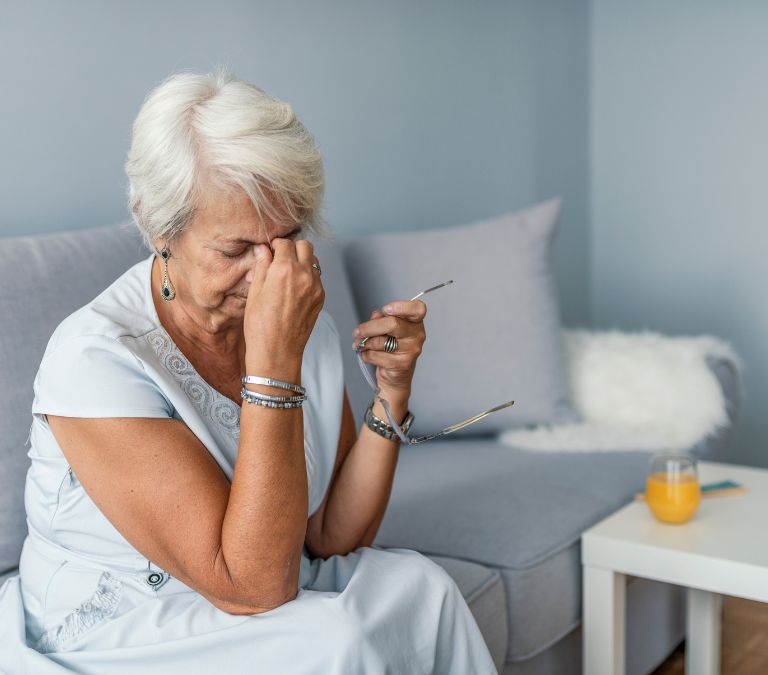It is normal for women to have mood swings and irritability during menopause because of hormonal fluctuations and other physical changes.
Menopause can bring either bittersweet or heartbreaking experiences for different people. Menopause is a time of change, and emotions are a part of that. The most typical emotional signs of menopause are mood swings and irritability.
There are several methods of treatment for menopausal symptoms, one of which is hormonal replacement therapy (HRT).
Estrogen levels in older women fluctuate erratically minute by minute. Consequently, the progesterone level reduces (but stabilizes at low levels in post-menopause, around age 55). Serotonin, a neurotransmitter that controls mood, is produced with estrogen.
Increased mood swings result from disrupted serotonin synthesis, brought on by fluctuating estrogen levels, progesterone, and other reasons. During this time, mood issues are frequent.
Additionally, anxiety and depressive symptoms may also contribute to the sleep disturbances frequently experienced during menopause. Inadequate sleep can worsen mood.
The chance of developing depression for the first time or experiencing a relapse increases significantly during menopause. Following menopause, however, this risk starts to decline once more.
A major researcher on an NIH-funded study that examines the numerous changes women experience during the transition is Dr. Gail Greendale of the University of California, Los Angeles.
An aspect of his research focused on mood, and he discovered that depressive mood and other symptoms, such as despair, and appetite loss, persistently rise throughout the transition until postmenopause.
Aspects of Menopause Mood Swings
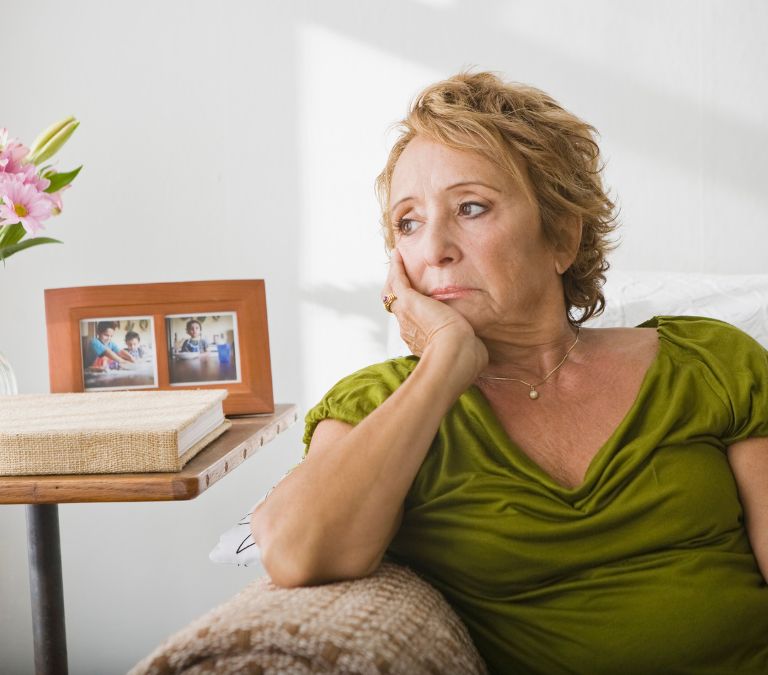
Aspects of menopause mood swings include:
Depression
Up to 25% of women experience depression at some point in their lives, a significantly larger percentage than what is observed among men. A sickness that can impede one’s ability to function is depression, as severe as arthritis or heart problems.
Evidence suggests that most women’s depressive issues start in their 20s or earlier. However, depressive symptoms may emerge for the first time after all menstrual periods have ended.
A period of transition called perimenopause does exist during midlife when women feel slightly more vulnerable to depression. During perimenopause, the menstrual cycle gradually lightens and becomes less intense throughout this time. Perimenopause continues until the transition to full menopause occurs.
During perimenopause, mild mood issues, sleeplessness, and anxiety are frequent. These symptoms can make some women major depression, a more serious mood illness. Women with a history of depression or postpartum depression are at risk of developing severe depression.
The premenstrual dysphoric disorder affects women around the time of their periods, and it increases the risk of serious depression throughout perimenopause. And some women experience perimenopause-related depression for the first time in their lives
An individual’s behaviors, thoughts, and feelings are all impacted by the mental health disorder known as depression. The signs and symptoms include:
-
Lack of interest in past activities once enjoyed
-
Sorrow, apathy, or emptiness
-
Exhaustion low energy issues
-
Memory loss
-
Poor concentration and decision-making abilities
-
Changes in appetite, weight, or both, difficulties falling asleep or staying asleep
-
Persistent sluggishness of movement or speech
Different forms of depression exist. However, major depressive disorder (MDD) is the official medical term for one of the most prevalent. The 2018 review found that menopausal women may be more prone to developing MDD.
Although most women go through menopause without any psychiatric issues, 20% of menopausal women are thought to experience depression at some stage.
Role of Mono-Amine Oxidase A In the Onset of Perimenopausal Depression

An essential brain enzyme called monoamine oxidase A (MAO-A) breaks down monoamines, induces oxidative stress, and affects apoptosis. Repeated estrogen levels fall with increased magnitude during perimenopause, and MAO-A quantity may rise for a month or more after estrogen levels decline.
In 2014, Paraskevi and his team conducted research work that investigated whether or not perimenopausal women had higher levels of MAO-A total concentration volume (VT), a measure of MAO-A density (41-51 years).
The result showed that when compared to reproductive age and menopause, MAO-A VT in perimenopausal women was higher on average by 34% and 16%, respectively.
The findings suggested that perimenopausal women had a core biomarker (MAO-A) that is also present in major depressive episodes.
Factors that Predispose Menopausal women to be Depressed
Researchers do not fully understand why depression affects women during perimenopause, but several factors may be involved.
Certain Health Factors: Menopause is not the only health-related factor that may affect depression risk. Certain health factors that may pose a particular risk include:
Chronic medical conditions: A chronic medical condition may increase your likelihood of simultaneously experiencing midlife depression and menopause.
Lifestyle: Research has shown a link between depressive disorders and lifestyle choices, including smoking and inactivity, indicating that while smoking and inactivity are not always causes of sadness, they increase the likelihood of depression in those who engage in them.
Menopause Brought on by Surgery: Women who have their ovaries removed reach menopause earlier than those who have their ovaries intact. The process of hysterectomy and treatment itself could result in stress.
The Psychosocial Effect: Menopause’s psychological and social effects may also impact mental health. Although some people believe that aging and menopause might be beneficial, others may believe that they become less attractive or womanly as a result of menopause or aging, and the symptoms can be stressful or interfere with their ability to work. They also lack social support.
These emotions may impact the person’s mental health. However, they might not always occur.
While age and expertise are valued in some cultures, youth is highly valued in others. People from cultures that value old age report reduced menopause symptoms, according to a 2021 study, which may imply that social norms can influence how the onset of menopause affects individuals.
Gender norms and expectations may also influence menopause symptoms. In heterosexual couples, women continue to perform most household and childcare duties despite more women entering the workforce. Stress may be impacted by juggling these obligations and menopause-related symptoms.
Coincidentally, during midlife, women are busier with caregiving jobs. Elderly relatives may require care due to disease, age, or disability. These factors could lead to stress or sadness.
Symptoms of Depression During Menopause
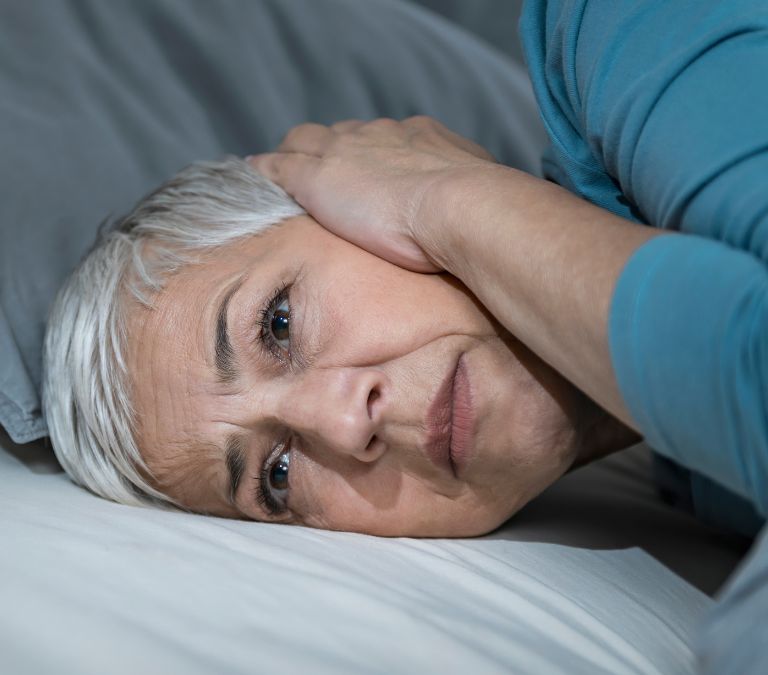
As women approach menopause, mental health concerns can devastate them. Perimenopause occurs between the ages of 42 and 52, and mental illness is quite common in women during this time.
Perimenopausal women have a considerably higher risk of developing severe depression. Some of the symptoms of depression associated with menopause include:
Sleep Issues
Because of nighttime heat flashes, women frequently endure periods of sleeplessness during perimenopause. You may become depressed up to ten times more frequently if you don’t get enough sleep.
Suicidal Thoughts
It is inappropriate to write off this kind of depression as trivial or assume it will disappear after the hormonal changes have settled. The menopausal process might take years, during which the patient and her family’s quality of life may significantly decline. Sadly, suicide among middle-aged women is rising.
Women between 45 and 54 years experience a significant suicide rate which might be connected to the biochemical modifications brought on by menopause.
There may be symptoms of perimenopausal depression that differ from those of conventional depression. Some of them include the following:
Difficulty Making Decisions and Absorbing Information
Many theories exist as to why some people experience menopausal brain more severely than others. It might be associated with estrogen levels or how a person’s hormone levels and neurotransmitters interact in the brain.
Additionally, it has been proposed that intellectual or physical exercise routines can protect brain function over a person’s lifetime.
Women report changes in their capacity to reason, make judgments, and maintain good mental function during perimenopause and the early phases of menopause. Some people call this “brain fog.” They can have trouble absorbing and applying new information.
Based on current knowledge, approximately two-thirds of menopausal and perimenopausal women experience this type of brain fog. The root cause is the effect of fluctuating levels of the hormone on the female brain.
Progesterone is typically the first hormone level to fall. Irritability, mood swings, and brain fog can result from this. Progesterone deficiency may also interfere with sleep. The ability of the brain to operate efficiently can be impacted by sleep disruption alone.
The well-known menopause symptoms, such as hot flashes, mood swings, irritability, mental confusion, and decreased energy, are brought on by estrogen levels. All of these factors may exacerbate the hormonally-related cognitive fog.
Loss of Interest in Activities Previously Enjoyed
Following menopause, a woman’s body and the sexual urge may change due to the reduction of estrogen and testosterone. Women who are menopausal or postmenopausal may realize that they are less amenable to being touched or stroked and less quickly aroused. Less interest in sex may result from that.
Reduced estrogen levels might also reduce blood supply to the vagina. That may impact vaginal lubrication and make the vagina too dry for enjoyable sex.
Overwhelming Fatigue and Lack of Motivation
The drastic changes in estrogen levels during menopause can cause fatigue or lack of motivation. Menopause symptoms such as occasional fatigue or difficulty maintaining concentration are common.
Low Appetite or Overeating
A few factors responsible for this include the following:
Less leptin and more ghrelin: Ghrelin, a hormone that stimulates appetite, is produced in greater quantities during perimenopause, which may explain why many women have regular hunger pangs at this time. During the peri- and postmenopausal periods, leptin levels decline, helping people feel fuller longer.
Elevated cortisol: Many constantly stressed-out people overeat and frequently choose foods heavy in fat and sugar as “comfort” foods. Therefore, stress-related hunger can rise throughout perimenopause and menopause as estrogen’s cortisol-dampening effects are reduced.
Less estrogen: Estrogen works to reduce appetite, much like leptin. Estradiol, a kind of estrogen, aids in controlling metabolism and weight. Appetite increases as estrogen levels drop during perimenopause and menopause.
Poor sleep: Hormone oddities might interfere with your sleep during perimenopause and menopause (perimenopause night sweats, for example). Hunger pangs can become much more intense if you don’t get enough sleep.
Persistent Feelings of Sadness, Hopelessness, or Irritability
Serotonin, a chemical in the brain that fosters positive emotions, is influenced by the hormones that regulate your menstrual cycle. Serotonin levels also decline when hormone levels do, which can increase irritation, anxiety, and sorrow.
According to Payne, falling levels of estrogen and progesterone might cause mood fluctuations that make it harder for you to handle situations you might typically let slide. “For some women, especially those who have experienced serious depression, these hormonal drops can trigger a depressive episode.
How to Cope With the Emotional Changes of Menopause
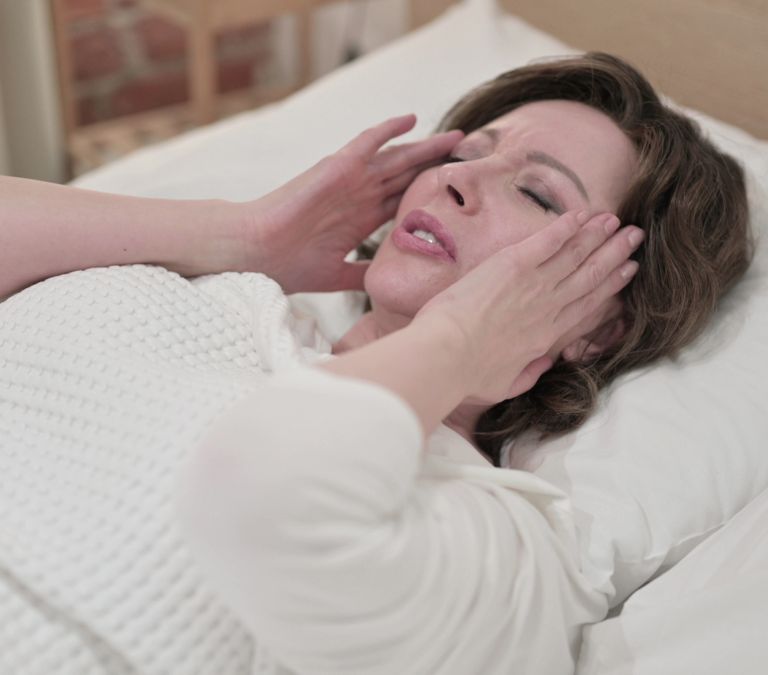
Keep an eye on your mood and observe patterns in other aspects of your life, such as your stress levels and sleep. Antidepressants have been given to some women to aid with the mental health-related symptoms of menopause, but there are alternative therapy choices that are more suited unless you have been diagnosed with depression.
Break the silence: By taking such steps as speaking with your family and doctor, creating networks of support in your community and at work, and discovering stress management techniques, you may be able to cope with menopause’s emotional rollercoaster and physician changes.
You do not have to go through it alone. Be open and honest about your symptoms; you can quickly get the required assistance. It can make you feel less isolated and improve your mood to confide in your partner or develop a close relationship with a friend.
More importantly, your immediate family can serve as a crucial support network in various ways, including recognizing how your symptoms influence your day-to-day life and providing you with social and emotional support.
They can also assist by improving home assistance and addressing communication gaps which could involve taking on more responsibilities or supporting lifestyle changes like starting an exercise regimen every day.
Hormonal changes in women often start years before the onset of menopause. There may be major effects on mental health throughout this time.
Women experience panic attacks more, and the prevalence of depression doubles. Seek the help of a professional to manage this if there are significant repercussions on one’s daily life.
Get More Exercise: To lessen probable symptoms, alter your lifestyle by getting more exercise, and doing your best to get enough sleep. As a result, you will be in a better shape to manage your stress.
Recognize that it is just a phase: The mood swings associated with female hormonal fluctuations during the menopausal transition typically do not last forever. The hormone-related hazards decrease the longer you wait after menopause.
However, those who choose to use antidepressants or other treatments to treat their illness may only need to do so for a relatively short period.
Counseling and Psychotherapy: Emotional issues and mental health concerns are treated through counseling and psychotherapy. Speaking with a qualified therapist in a group setting, one-on-one, or with your spouse or family members is what counseling entails.
It helps you to dig deeper into your difficulties and concerns, deal with problematic behaviors, and address various mental health conditions like depression and anxiety.
Talking with a therapist is typically the main component of psychotherapy, but other techniques, including art, music, theater, and dance, may also be employed occasionally.
Discussing your sentiments with others, especially your family and close friends, can help you process your feelings about yourself and them. Family counseling sessions are occasionally provided for couples or families.
You will have regular appointments with your therapist for many months or even years, typically once per week. About 50 minutes are allotted for each session, while group sessions are frequently slightly longer.
Acupuncture: By balancing hormone levels and promoting the synthesis of dopamine and norepinephrine, acupuncture treatment may also benefit some women with mood swings. Qi, maintaining the equilibrium of energy flow inside the body, is the principle that acupuncturists work with.
Outlook: Once the body’s hormonal system has stabilized, menopause- and perimenopause-related mood fluctuations usually subside, which may require several months or even years. Developing an early work-through plan incorporating positive lifestyle decisions can frequently reduce mood swings. The best action may be medical intervention if you require further support.
Therapeutic Behavior Modification (TBT): With TBT, you can break free from unhelpful behavioral patterns and learn to think more optimistically about life. TBT focuses more on the present than on past or childhood experiences.
Several mental health issues have been successfully treated with TBT. For example, TBT can be especially beneficial for depression, panic attacks, and anxiety. TBT is effective for those with depression, anxiety, and other mental health issues.
Anxiety
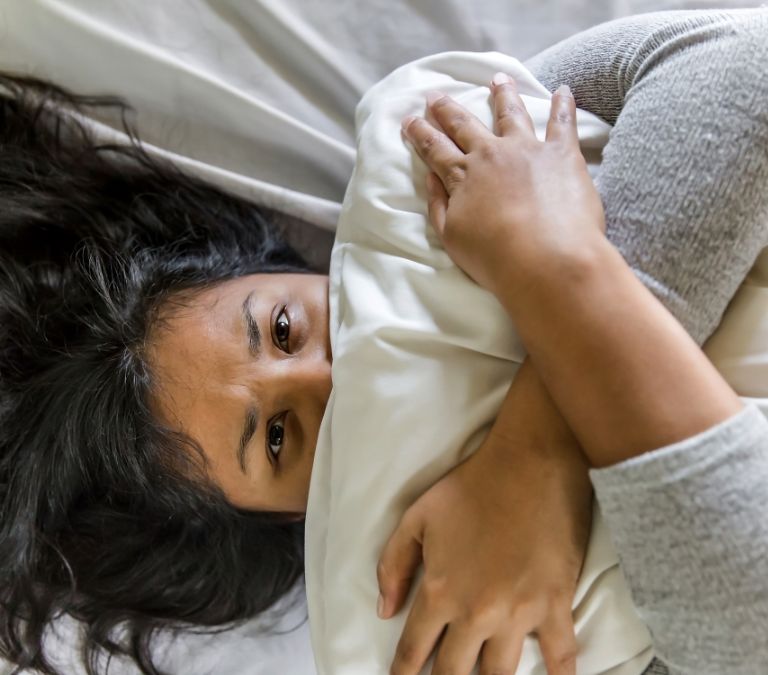
According to medical research, women generally are twice as likely as their men counterparts to suffer anxiety even in everyday situations. For some women, the menopause transition can be a difficult time.
Their period slows down or stops altogether due to a sudden decline in hormone levels, and some other unfun symptoms, including hot flushes, start to appear.
However, the hormone abnormalities that appear during menopause can also support the emergence of anxiety or exacerbate pre-existing anxiety and despair. Symptoms of menopausal anxiety include:
-
Fear Attacks
-
Breathing difficulty
-
Fatigue
-
Dizziness
-
Chills
-
Heart flutters
-
Persistent sweating
-
Nausea
-
Tense muscles
Many women discover that between perimenopause and menopause, they feel noticeably more worried, depressed, or wired. Memory and the ability to focus may suffer due to these hormonal changes in the brain’s structure and function. Hot flashes could also bring on memory lapses.
But those modifications might also impact the brain’s chemical composition and, consequently, your mood. According to psychiatrist Lilian Gonsalves, MD, the changes in hormone levels in your body throughout perimenopause and menopause may occasionally make you feel nervous or melancholy.
However, persistent, severe panic attacks, anxiety, and despair are not the norm.
According to a study conducted in Brazil in 2020, 58% of perimenopausal women between the ages of 45 and 55 reported having anxiety symptoms. 62% of participants in the same research showed signs of depression.
But in 2016, a larger investigation conducted in China found that depression affected roughly 26% of women between 45 and 60 years, and anxiety affected about 13%.
As with depression, declining estrogen levels can alter how your brain works, resulting in anxiety. Estrogen has been associated with serotonin (also known as the happy hormone) levels in the brain.
There is proof that estrogen levels are also correlated with cortisol levels (the stress hormone), so cortisol levels rise when estrogen levels fall. The brain is multifaceted. Therefore, additional hormones and chemical elements are likely at play.
Certain brains are more vulnerable to the effects of fluctuating hormone levels. For instance, if you’ve experienced postpartum depression, you may be more susceptible to experiencing mood swings during menopause. Premenstrual syndrome can also get worse during perimenopause.
The impact of fluctuating hormone levels can affect some brains more than others. For instance, if you’ve experienced postpartum depression, you may be more susceptible to experiencing mood swings during menopause. Premenstrual syndrome can also get worse during perimenopause.
It is crucial to be made aware of the fact that person’s who have ever struggled with a more severe kind of anxiety condition, the transition to menopause may make it worse once again.
Any time during the menopause transition, anxiety might strike. Early in perimenopause, while the period is very regular, anxiety can sneak up on you. It is crucial to note this symptom because it might start subtly and quietly, and you may not realize it is related to menopause.
Although it is a fact that anxiety might get worse throughout perimenopause, we are unable to predict whether it will go away on its own. As you will see below, you might handle this symptom differently.
Therefore we strongly advise you to promptly seek treatment if you need it.
How Is Anxiety Managed?
Psychotherapy, antidepressants, hormone therapy, hormones, or supplements that improve mood are all potential treatments for anxiety brought on by menopause. Menopause can be treated using Cognitive Behavior Therapy (CBT).
Additionally, women can evaluate how their emotions, thoughts, and behavior are related to the use of this therapy. Women can learn how to change their behavior by adopting cognitive behavior therapy to help lessen the severity of menopausal symptoms.
One needs to ensure the body is getting enough rest and exercise. It is equally important to consume a healthy, balanced diet cutting down on processed and sugary foods. Many have found the following suggestions to be particularly helpful.
Diet rich in Phytoestrogens: Plant-based substances known as phytoestrogens have characteristics similar to those of estrogen. Studies have suggested that they improve cardiovascular health, treat acne, prevent osteoporosis, and lessen hot flashes.
However, there is conflicting evidence regarding how well they can combat other perimenopausal symptoms. While complex carbs work as a moderate sedative and help you maintain emotional stability, alcohol and caffeine can increase menopausal anxiety-related symptoms.
Therefore, consume foods high in estrogen or take supplements to get your daily dose of phytoestrogens. Some examples include:
-
Seeds and Beans (e.g., walnuts, sesame seeds, flax, almonds, and sunflower seeds).
-
Fruits, strawberries, cranberries, and apples.
-
Soybeans
-
Tofu
-
Black coffee and red wine
-
Olive oil
-
Red clover
-
Root licorice tea
-
Barley, wheat, and oats.
Further, it is best to seek medical advice while taking phytoestrogens as they come with their risks and side effects and may interact with other prescribed medications.
Engaging in Exercises: Scheduling time for regularly participating in aerobic exercises has many benefits, as it helps reduce anxiety and improve your general well-being, body shape, self-worth, and happiness.
It also lowers stress and anxiety levels. If you are not exercising already, try figuring out how to fit even a little bit into your day.
It can be the last thing you want to do since you feel drained and unmotivated. But you will be amazed at how better you will feel after taking a short stroll or jogging around your block.
Relaxation: Some ladies may experience the complete opposite reaction while contemplating relaxation. Although it seems simple, it can occasionally be challenging and irritating.
To enjoy relaxation, think about a practice that works for you. Many have found Yoga, breathing exercises, and meditation to be completely rewarding.
Be Positive: Keeping a positive outlook is important because dwelling on problems only worsens sadness and anxiety. On the other hand, keeping your mind on good and positive thoughts can help you avoid despair and worry.
Seek medical intervention if you are depressed, anxious, or experiencing menopausal symptoms. By seeking assistance, you may manage a time in your life that is already challenging and return to enjoying it.
Irritability

Another symptom that menopausal women come down with is irritability. Occasionally, it resembles rage more. Most frequently, menopausal women feel irritated over seemingly minor issues that otherwise would not have annoyed them.
Factors that Cause Menopausal Irritability
Brain chemicals, like GABA, helps in calming you down. Serotonin and dopamine, two of the “happy” neurotransmitters, and norepinephrine, which gives energy, are all influenced by progesterone and estrogen.
During menopause, estrogen and progesterone levels fall along with their contribution to releasing these hormones. And it can be uncomfortable. Menopausal women frequently feel increased irritability due to fluctuating hormone levels.
How To Manage Menopausal Irritability
For women going through the menopausal phase of life, there may be little or nothing you can do to eliminate all sources of your irritation. However, steps can be taken to better regulate your reactions to triggers.
According to Ayurvedic Cure, St. John’s Wort, chamomile, hops, peppermint, and lavender are just a few of nature’s natural therapies for irritation. Also, valerian root has sedative properties; thus, it not only soothes but may also aid sleep.
Matcha tea is an excellent substitute for caffeine, which can irritate you and leave you feeling anxious. It is unquestionably among the foods to stay away from during menopause.
Discover your triggers: Certain lifestyle choices, such as drinking a lot of coffee and smoking, might make people anxious.
Dehydration may cause you to overreact over minor matters, leaving you embarrassed and awkward. Additionally, if you frequently wake up from hot flashes, it could be challenging to deal with difficult feelings. However, each person’s body functions uniquely.
Maintaining a daily notebook for at least two weeks can help you identify these triggers. It would be helpful to keep a journal of your daily activities, including what you ate, how much sleep you had, whether you exercised, and how you felt throughout the day.
If keeping a journal is not your style, mood-tracking or period-forecasting apps are wonderful alternatives.
Give counseling or anger management a shot: Your anger can be controlled with counseling and anger management techniques.
Based on a 2017 study, women experiencing menopausal symptoms and diabetes benefited tremendously from group counseling that emphasized self-care.
Ask your doctor if there are any menopausal women support groups, anger management classes, or perimenopause rage counselors they may recommend.
Use the medicine as necessary: You may find that taking medication can lessen your perimenopause anxiety and fury.
To balance your moods and stop uterine bleeding, a doctor may prescribe birth control tablets like Alesse or Loestrin. You could also use antidepressants like escitalopram (Lexapro) as a short-term fix to feel more in control.
Speak with your healthcare practitioner if you believe medication may be beneficial. They can help you narrow down your alternatives and find something that best meets your requirements.
Insomnia
The inability to sleep off or stay asleep is referred to as insomnia. It is a typical menopause experience symptom. Hormonal changes could bring it on. It might also develop as a side effect of menopause’s other symptoms like hot flashes.
Sleeplessness is a common symptom of menopause and perimenopause. While some people sometimes have trouble sleeping, others may have chronic insomnia.
Insomnia that interferes with everyday activities affects 26% of perimenopausal and menopausal individuals, according to a research conducted in 2018.
The prevalence of insomnia among women rises with age. The prevalence of sleep problems is as follows, per the Study of Women’s Health Across the Nation (SWAN):
Premenopause: 16-42%
Perimenopause: 39 to 47%
Postmenopause: 35% to 60%
Causes of Insomnia in Menopause
According to research, there isn’t a single definite cause for insomnia during menopause. Several factors: could cause it.
Hormone adjustments
Low hormone levels may make insomnia during menopause more likely, according to some research.
Estrogen: SWAN claims that earlier studies have linked decreased sleep with lower estrogen levels which are particularly true if the reduction in hormones occurs quickly, as it does in cases when the ovaries have been surgically removed.
The decline in estrogen results in menopausal symptoms, such as sweats and hot flashes (vasomotor symptoms), anxiety, and depression. On the one hand, anxiety makes it difficult to fall asleep, and depression, on the other hand, makes it difficult to get to sleep and causes early morning awakenings.
However, it is suggested that anxiety and sadness may be rooted in menopausal sleep disruption. The frequent side effects of estrogen reduction, such as joint discomfort and bladder issues like urinating at night, can also interfere with sleep.
Progesterone: Since progesterone acts on brain circuits to induce sleep, menopausal progesterone reduction may be a factor in sleep disturbance.
Melatonin: With age, levels of melatonin, another important hormone for sleep, drop. Melatonin secretion is somewhat affected by estrogen and progesterone, and levels fall throughout the perimenopause, frequently exacerbating the issue.
Slumber apnea
The perception of sleep apnea as a sleeping illness specific to men has changed. According to studies, women who have undergone surgical menopause are more likely to experience sweats at night and hot flashes than those who have undergone natural menopause.
Progesterone may have a part in this, impacting weight gain. A drop in progesterone may lead to partial upper airway blockage and decreased respiratory drive because it affects muscle activation posterior to the throat and the stimulus for breathing.
Not all cases of sleep apnea involve loud gasping and snoring. Women who have sleep apnea may also experience headaches, sleeplessness, melancholy or anxiety, and daily weariness. Not all women snore out when they are asleep.
How To Manage Menopausal Insomnia
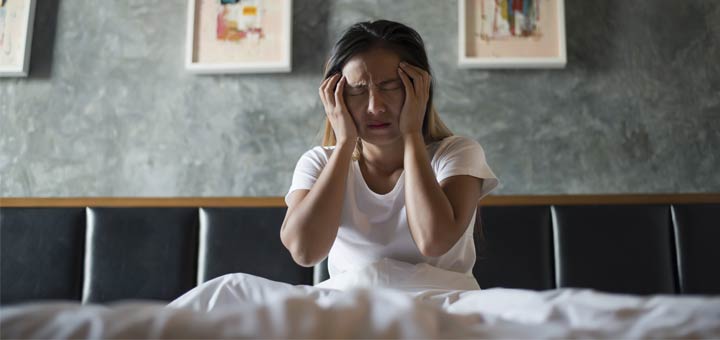
You can get better sleep by adhering to several fundamental principles that promote healthy living in general:
-
Exercise
-
Eating well
-
Controlling stress
-
Sustaining healthy connections and participating in societal activities.
-
Intellectually stimulating the mind.
However, there are other moments when you are powerless over events and want some assistance. Menopausal sleep disturbance has its own set of therapy options which include
Hormone Therapy:
Hormone therapy is the major treatment for sleeplessness brought on by menopause. Restoring the missing hormones alleviates many menopause symptoms.
While receiving this medication, patients may discover that they enjoy their sleep as they report fewer hot flashes. Hormone therapy includes the use of creams, topical gels, and patches. Also available as pills or an implant, people can consume it internally.
Talk Therapy
Talk therapy may assist persons who are going through insomnia due to mood swings, anxiety, or despair to comprehend and deal with these emotions.
Due to their potentially harmful side effects, doctors rarely prescribe sleeping medications to treat insomnia. Many of them can be addictive and unsuitable for treating chronic sleep issues.
Staying away from alcohol, nicotine, and caffeine: Alcohol, coffee, and smoking all hurt sleep. A small amount of alcohol can decrease the overall quality of sleep.
Aromatherapy
The relaxation-inducing effects of aromatherapy may assist in lessening hot flashes. The participants in a clinical trial with 100 women experienced 50% fewer hot flashes after inhaling lavender essential oil for 12 weeks.
According to other studies, massage and aromatherapy combination has proven to be more effective than aromatherapy or massage alone.
Causes of Lack of Concentration and Forgetfulness During Menopause
Menopause symptoms, including trouble focusing and memory problems, are typical. It could seem like the brain is not functioning as well as it once did, resulting in a crippling feeling that makes you lose faith in your capacity to carry out daily tasks.
Forgetfulness and brain fog, both of which are menopause symptoms that are linked to concentration difficulties, can all contribute to stress, anxiety, and mood swings.
Hot flushes, night sweats, adult in a variety of other menopause-related physical symptoms can make it difficult to concentrate on other things and even cause concern and stress, leading to forgetfulness.
Concentration problems are frequently related to other menopause symptoms, especially psychological ones like melancholy and anxiety. Your hormone levels are frequently the direct cause of changes in brain function:
The brain’s many regions are necessary for diverse functions. For instance, some support memory while others control mood. The brain contains many estrogen receptors, and estrogen facilitates communication between the various brain regions.
Fluctuating or low estrogen levels can affect memory, brain function, and mood. Studies show that women’s low estrogen levels have been associated with poorer cognitive function.
The hormone estrogen is not the only one at play; other hormones, such as testosterone, cortisol, and a protein in the brain known as monoamine oxidase A, are also likely to affect mood swings and brain activity.
You could experience increased tension or anxiety during perimenopause and menopause. Your cortisol levels may increase, which may affect the brain’s functioning.
Remember that everyday occurrences can derail focus and cause distractions. Many factors can come into play, including problems at job, family, aging parents, relationships, etc. It makes sense that your brain is not always functioning at its optimum when menopausal alterations in brain function are added to the equation.
Causes of Mood Swings During Menopause
During and after menopause, people may feel depressed and low on themselves. Some people may cry more often than usual or have stronger reactions to things.
Serotonin is a neurotransmitter that controls mood, and estrogen is linked to its production. Serotonin production is disrupted due to fluctuating amounts of estrogen and progesterone during menopause, as well as other factors which cause mood swings. Disorders of mood are frequent during this period.
Reactions can compound, as in the case of night sweats. These are heat flashes that happen when a person is asleep. A woman may wake up in the middle of the night from night sweats that are too severe.
Multiple nights of restless sleep can cause hazy thinking, anger, and other traits linked to menopausal mood swings.
Additionally, those beginning perimenopause have greater brain protein monoamine oxidase A (MAO-A) levels. There are connections between the symptoms of depression and this protein.
Risk Factors for Depression During Menopause
Severe stress in their lives: Stress perception may lead to an aggravation of symptoms related to the menopausal transition, like depression.
Stress is a powerful stimulant. It produces strong chemicals into the bloodstream, such as cortisol, which increases the heart rate, muscular tension, uptake of glucose, and immune system responses.
When it comes to stress, the HPA (hypothalamic-pituitary-adrenal) is a conduit between the brain and the body. When our brain determines that stress is necessary, messages are sent to the HPA axis, which releases a complicated series of chemicals that leads to the release of stress hormones like cortisol and glucocorticoids into our bloodstream.
Also, the decrease in estrogen levels during menopause may increase cortisol levels in the body which also induces stress reactions.
The high level of cortisol produced contributes to a variety of mental health issues, most notably depression. It has been demonstrated that people with chronic depression and many suicide victims have much higher glucocorticoids, cortisol, and other stress hormones in their bloodstream.
Unsatisfactory Relationship With Loved Ones
An unhealthy relationship can lead to migraines, insomnia, or even emotional imbalance, leading to depression. Already, a menopausal woman has insomnia, anxiety, and even depression to battle with. Adding an unsatisfactory relationship to the list will heighten the stress level and increase the risk of depression.
A difficult living situation
When an individual faces overwhelming adversity or significant life challenges over which they have no control, depression may set in. People who live in poverty have difficulty making ends meet, live in dangerous or crowded housing, fear crime, and may experience a high-stress level.
And as discussed above, stress can lead to depression. Adding to the menopausal depression level.
How To Improve Your Mood During Menopause
No doubt everyone deserves to be happy during all phases of their lives, including menopausal women. A tested and trusted therapy that has helped women of all ages and walks of life cope with the challenging phase of menopause is hormone replacement therapy.
Hormone Replacement Therapy
Hormone replacement therapy (HRT) can be used to alleviate the symptoms of menopause. As you near menopause, HRT replaces hormones produced at a reduced level. Female hormones are present in medications used for hormone replacement therapy.
When you reach menopause, your body stops producing estrogen, so you can take medicine to replace it, which can help relieve most menopausal symptoms to an easier coping.
Types of HRT
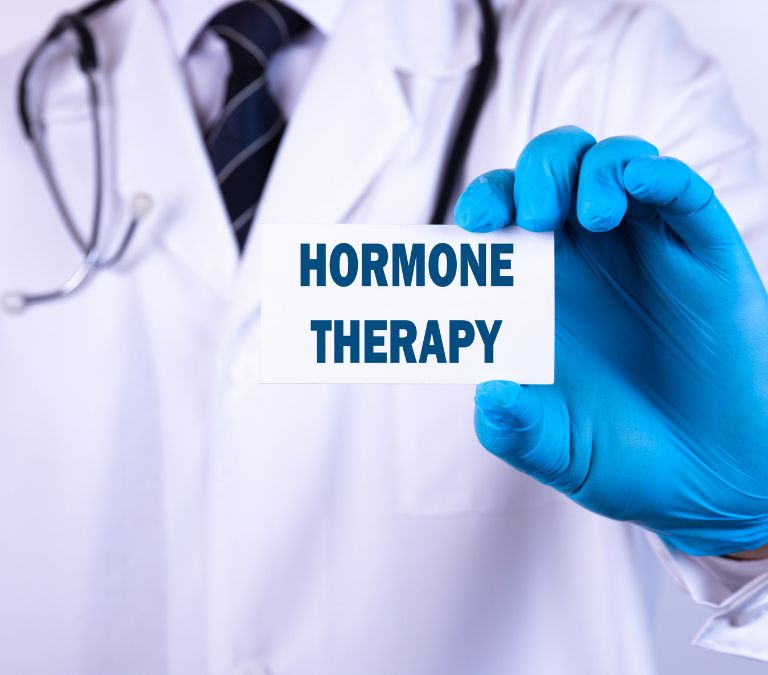
Systolic hormone treatment: A larger amount of estrogen is often present in systemic estrogen, which can be taken as a tablet, skin patch, ring, gel, cream, or spray and is absorbed throughout the body. Estrogen is used to treat any of the typical menopause symptoms.
Vaginal products with low doses: In cream, pill, or ring form, low-dose vaginal estrogen treatments reduce the quantity of estrogen absorbed by the body. Due to this, low-dose vaginal treatments are often solely used to treat menopausal symptoms of the vaginal and urinary systems.
HRT is very effective as a treatment for low mood brought on by menopause. The proper estrogen can significantly help with these depressive symptoms and other menopause-related problems. When taking HRT, women feel more at ease, energetic, driven, and happy.
Some females also need to take testosterone, which is often administered as a gel but can alternatively be implanted. Before menopause, the ovaries produce more testosterone than estrogen.
This hormone can help mood, energy, and attention while also crucial for libido. It can be incredibly helpful for younger women because their emotional vitality returns.
To that end, doctors recommend trying the medication for three months to determine if it works. If it does not, they might advise adjusting the dosage or switching the type of HRT you use.
Combined Hormone Replacement Therapy: Combined HRT is a blend of estrogen and progestogen. The prescription is for women who still have their wombs intact.
Estrogen-only HRT. Often, it is prescribed for women who have had their wombs removed in a hysterectomy.
Estrogen can be administered in a variety of ways, including:
-
Tablets: This is taken orally.
-
A patch: it can be applied to the skin.
-
An implant: administered under local anesthetic
-
Estrogen gel: This can be applied on the skin and absorbed into the body.
-
Estrogen spray: This is applied to the forearm.
Pros and Cons of HRT
For most women, the advantages of HRT typically outweigh the risks. The type of HRT a woman uses, the length of time she uses it, and her health risks will all affect the hazards, which are typically quite low.
Advantages of HRT
-
It helps improve vaginal dryness, which makes sex less painful and more enjoyable.
-
It protects the body against bone loss that can lead to hip and spinal fractures.
-
It reduces the risk of colon cancer.
-
It helps relieve hot flashes, especially at night.
-
It helps to improve relaxation, thereby making sleep refreshing and pleasant.
Risks Associated With HRT
-
Blood Clots: HRT patches or gels do not raise the risk of blood clots. However, blood clot risk is increased by taking HRT pills, although it is still low.
-
Breast Cancer: Taking HRT that contains estrogen has little to no impact on breast cancer risk. However, there may be a slight increase in the risk of breast cancer when using combined HRT.
The risk rises with the length of HRT use and decreases once HRT is stopped.
-
Stroke: Although taking HRT pills is linked to a little increase in stroke risk, stroke risk in women under 60 is typically quite low. Thus the overall risk is still very low.
-
Gallbladder Disorder: Gallstones or gallbladder disorders could develop. When a woman receives therapy in the form of pills, her risk of developing gallbladder disease rises.
Long-Term versus Short-Term Use
HRT has proven very valuable in the treatment of menopausal symptoms. Long-term usage of HRT is not advised because it raises the risk of heart attack, stroke, and breast cancer. Once menopausal symptoms subside, most women discontinue using it.
Long-term use (more than five years) is associated with other health risks. Since it is less likely to result in your symptoms returning, gradually reducing your HRT dose is usually advised.
If you are thinking about HRT therapy, openly communicate with your partner so he knows how you feel and can better understand why you are interested in HRT. That way, you have a better support system.
Visit your expert along with your spouse. Another set of ears at your consultation can aid your memory of the specifics of your appointment and serve as a crucial sounding board when discussing your treatment alternatives.
Is HRT Affordable?
Important questions patients enquire about is the cost of HRT, and this is reasonable as most insurance plans do not cover it. However, hormone replacement therapy is affordable.
On average, the cost of HRT is somewhere in the range of $30 to $90 per month. The cost of your treatment is determined by a few factors, such as the treatment method and the hormone level required in each dose.
Conclusion
Mood swings and irritability during menopause can be a challenging time. However, the information you need to make informed decisions that will help you successfully sail through this phase is now at your fingertips.

